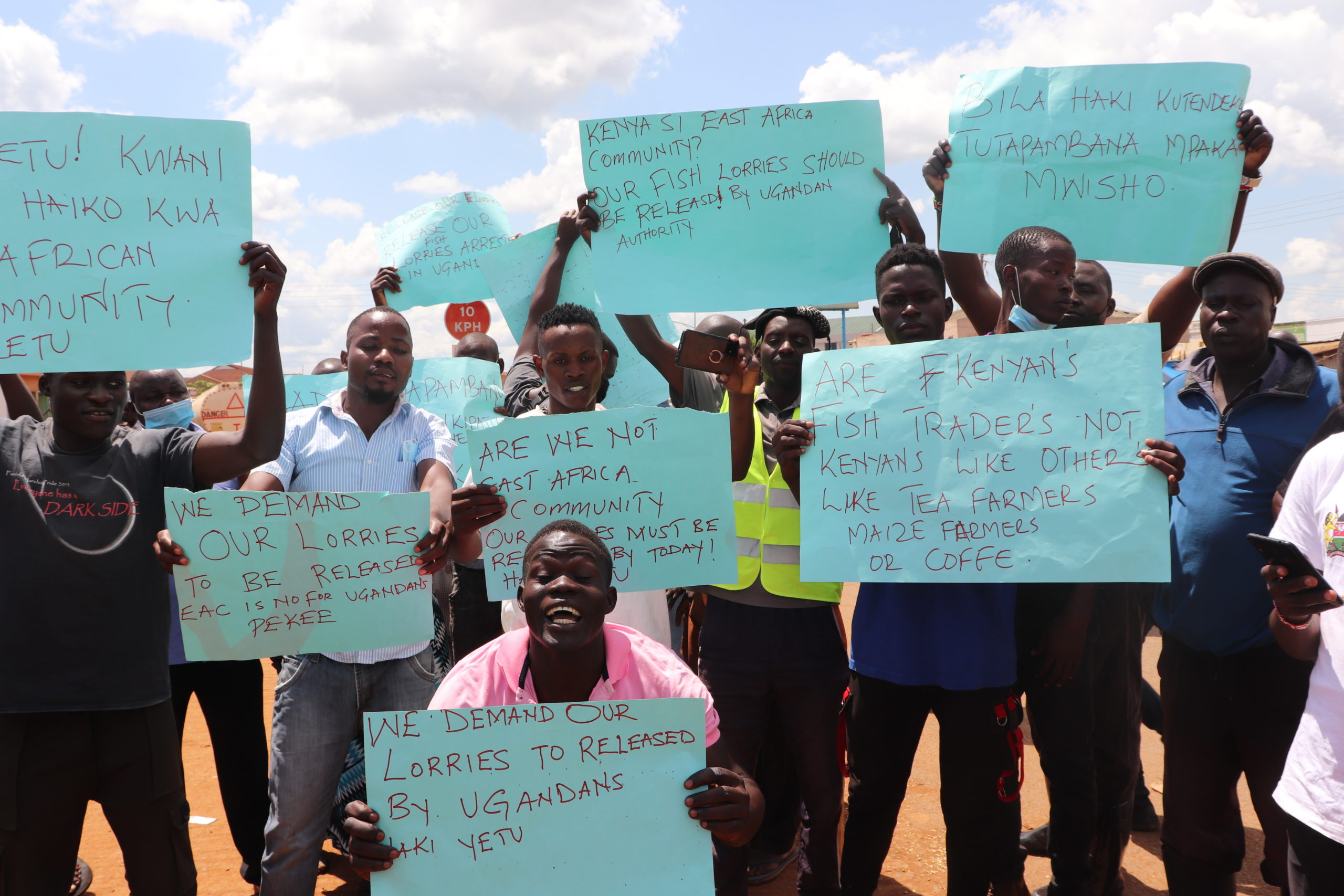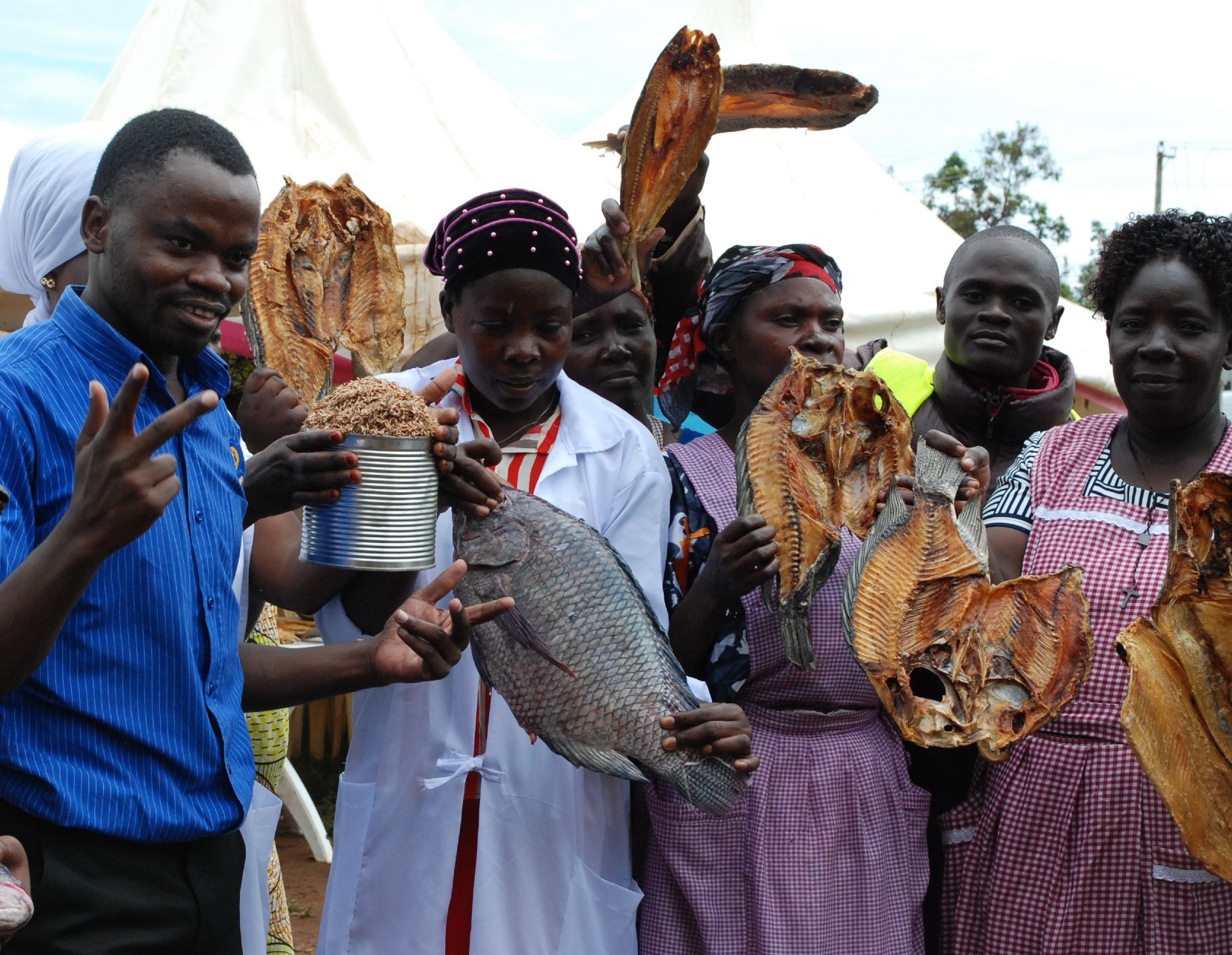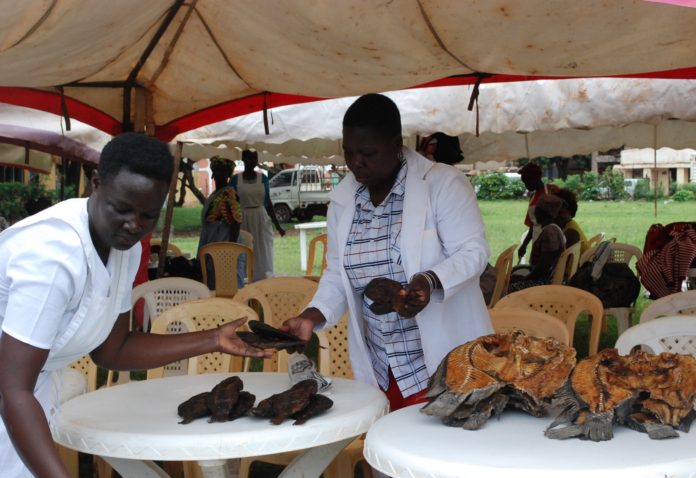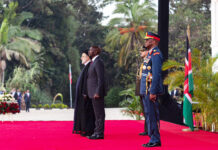|
Getting your Trinity Audio player ready...
|
By Okong’o Oduya
Busia County, Kenya: At noon on a Monday along the Kenya-Uganda border in Busia town, fish traders are carrying placards and demonstrating. They are demanding the release of their Lorries carrying 100tons of fish on transit to the Democratic Republic of Congo impounded by the Ugandan Authorities.
Khayofu Reuben, secretary of Busia Fish traders he says five lorries carrying 100tons have been confiscated across the border by the Ugandan security personnel adding that this is not the first time their lorries are being apprehended in Uganda.
According to him, the Ugandan security personnel alleges that the Kenyan fish traders smuggle Ugandan fish, package, and transport them to DRC which according to them is a lie.
Khayofu noted that they source their dry fish from Lake Turkana and they don’t see the reason why the Ugandan authorities should be impounding their lorries.
“We have a problem; our five lorries with 20tons each destined to DRC have been arrested in Uganda. When we demanded to know why, we have been told it’s because we smuggle fish from Uganda, package and sell them to the outside market.”
According to them, Kenya has no capacity to produce fish for export, but everyone knows that we buy dry fish in Lodwar from Lake Turkana before exporting,” he said.

They are now calling upon the Kenyan government to intervene and stop the frequent harassment from the Ugandan authorities to allow them to access to the market with ease.They believe this will not only work for the conducive business environment across east Africa but also promote free movement and trade of goods across the East African Region.
According to Emily Okumu, a fish trader at Busia fish market they export 4800tons of dry fish to DRC every year but along the way, they face a myriad of challenges which include parting with thousands of shillings to bribe their way to cross Uganda.
She says they adhere to all requirements needed to transport dry fish but still the Ugandan authorities along the way find a reason to stop them from proceeding to the market unless you pay what they have asked for, you will not be allowed to proceed which in many cases results in losing millions of shillings.
“Our fish just transit across Uganda, we don’t sell there. We fail to understand why they are arresting our fish? If you are talking about the regulations needed when transporting the fish, we do follow them. We just don’t know what else we need to do to be allowed to move freely across Uganda without harassment. Our efforts to involve Ugandan Revenue Authority to intervene are in vain,” she noted.

Alice Atieno Wanga says in 2010 they were robbed of 3 Lories carrying 60tons of fish by Ugandan officials, they sold the fish, and never did they ever get a word from the Kenyan government.
Francis Aketch, chairman of the Busia fish traders Association, says there is no way they will smuggle fish from Ugandan, package and export them to DRC. According to him, they only import 1ton of fresh fish from Uganda and it will not be possible for them to rely on fish from Uganda to export 100tons of dry fish to DRC every week.
“Let’s be honest with each other. Fish from Lake Victoria has reduced in number for Uganda to allege that we smuggle their fish, they are not being honest. We buy dry fish from the Lodwar package and export. This habit of confiscating our consignment on transit to DRC by the officials every time from Ugandan government has to stop.”He said.
Busia county Deputy Governor, Moses Mulomi however is calling upon all those involved in fish trading, locally and internationally to adhere to the laid down rules and regulations to run the business smoothly to avoid cases of harassment from the Ugandan authority.
He is appealing to the National government in collaboration with the Ugandan government to find a lasting solution to the endless wrangles between the Kenyan fish traders, fishermen, and the Ugandan authority.
“We are calling upon the national government and the counterpart Uganda, as we do the business we carry out in peace to avoid wrangles and challenges we experience daily,” he said.
According to him, Aquaculture plays a very important role in the economy not only through nutrition but also it creates wealth for farmers as well as traders.
Reports from the department of fisheries in Busia county indicate that in 2019, fish production from Inland Capture fisheries contributed 5,004,810kgs of the County’s total fish production amounting to Ksh509, 152,638 with the principal fishery being that of Lake Victoria.
Timothy Odende, the director fisheries department in Busia County noted that aquaculture production amounted to 151,200kgs earning farmers Kshs74, 640,827, a 66.4% increase from the previous year. Capture fisheries production also increased by 2.6% owing to the weekend ban giving room for reproduction and growth of smaller fish and also the introduction of fish cages where fishermen have shifted to aquaculture in the open waters hence reducing pressure on capture fisheries.
For the last few years, there has been a decline in fish stocks in Lake Victoria thereby creating a wide gap between supply and demand for fish in the County.
The directorate of fisheries has put a lot of effort and resources into promoting aquaculture as a business both in the lake through open water cage culture systems and aquaculture parks on land systems to meet the growing population and demand for fish as a food and protein source.
The directorate through Kenya Climate Smart Program (KCSP) is reviving fish hatcheries in the County including Wakhungu, Okerebwa, and Butula hatcheries to ensure a steady supply of quality and affordable fingerlings.
The EAC Customs Union Protocol Under Article 13 stipulates that the Partner States remove all existing non-tariff barriers to trade and not impose any new ones. Kenyan fish traders are suffering at the hands of Ugandan authorities despite this agreement.














